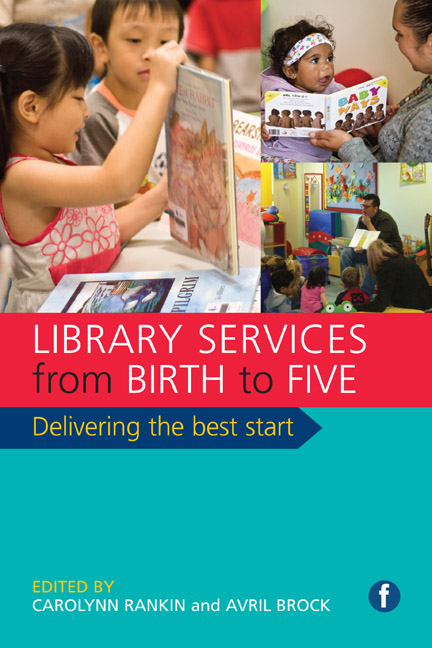Book contents
- Frontmatter
- Contents
- List of figures and tables
- Contributors
- Acknowledgements
- Introduction
- 1 Take them to the library: the pathway of opportunity
- 2 What you need to know about promoting early reading with young children from birth to five
- 3 Attribute value wrong, It should be `City of Literature ... it all starts with ABCD! The City of Melbourne and the Abecedarian Approach
- 4 Transforming practice through research: evaluating the Better Beginnings family literacy programme
- 5 People and partnerships, skills and knowledge
- 6 Resources for early years libraries: books, toys and other delights
- 7 Using digital media in early years library services
- 8 Using play to enhance early years literacy in babies and toddlers: ‘Read, Play and Grow’ at Brooklyn Public Library
- 9 Inclusive early literacy
- 10 Music and rhyme time sessions for the under-fives
- 11 Reaching your audience: the librarian's role
- 12 Successful library activities for the early years and ways to promote books effectively
- 13 Designing family-friendly libraries for the early years
- 14 Planning: organizing projects and money matters in the early years library
- Index
4 - Transforming practice through research: evaluating the Better Beginnings family literacy programme
Published online by Cambridge University Press: 08 June 2018
- Frontmatter
- Contents
- List of figures and tables
- Contributors
- Acknowledgements
- Introduction
- 1 Take them to the library: the pathway of opportunity
- 2 What you need to know about promoting early reading with young children from birth to five
- 3 Attribute value wrong, It should be `City of Literature ... it all starts with ABCD! The City of Melbourne and the Abecedarian Approach
- 4 Transforming practice through research: evaluating the Better Beginnings family literacy programme
- 5 People and partnerships, skills and knowledge
- 6 Resources for early years libraries: books, toys and other delights
- 7 Using digital media in early years library services
- 8 Using play to enhance early years literacy in babies and toddlers: ‘Read, Play and Grow’ at Brooklyn Public Library
- 9 Inclusive early literacy
- 10 Music and rhyme time sessions for the under-fives
- 11 Reaching your audience: the librarian's role
- 12 Successful library activities for the early years and ways to promote books effectively
- 13 Designing family-friendly libraries for the early years
- 14 Planning: organizing projects and money matters in the early years library
- Index
Summary
Libraries: linking families with literacy
You need to learn to read. It helps you with every other subject and if you don't read, you struggle with everything else in life.
(mother, quoted in Barratt-Pugh, Kilgallon and Statkus, 2009)Libraries play a vital and unique role in supporting and improving the literacy levels of the communities they serve. Libraries are regarded as trusted community places that are freely available, supporting lifelong learning across the ages and contributing to the social benefit of the broader community (Krolak, 2005; Hillenbrand, 2005; Scott, 2011). In a 2013 US study, parents perceived libraries as being important and safe places for their children, cultivating within them a love of books and reading and providing information and resources not always available at home (Miller et al., 2013).
International research demonstrates the impact of low literacy on an individual's life chances, with strong links between poor literacy skills, lower educational attainment, lower earnings, poorer health and poorer social outcomes (Hartley and Hoyne, 2006). What is also widely recognized is that the most effective and efficient way to address these issues is from the very beginning of life (Heckman and Masterov, 2005).
From its launch in 2005 to the present, Better Beginnings, an initiative of the State Library of Western Australia, has grown to be one of the most extensive and successful family literacy programmes in Australia. Delivered through public libraries and community health centres throughout Western Australia, this universal programme is designed to provide positive early literacy experiences for all Western Australian families with young children aged from birth to three.
Dynamic and ever-evolving, Better Beginnings makes connections – between parents and children, families and libraries, state government and local councils, health and education services, and between research and practice. Edith Cowan University has conducted an independent, longitudinal evaluation of the programme since its inception, which has proved crucial not only to demonstrating its effectiveness but also, equally importantly, in identifying new directions and areas of need.
Better Beginnings: the why, what and how
Extensive international research shows that children's development is influenced by nature and nurture, that is, genes and the environment. Research also shows that the first five years of life are the most significant time for brain development, while the most rapid growth happens in the first three years.
- Type
- Chapter
- Information
- Library Services from Birth to FiveDelivering the best start, pp. 81 - 98Publisher: FacetPrint publication year: 2019
- 1
- Cited by

